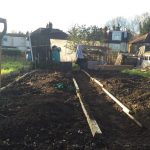The first thing that struck me about Regenesis is one third of the book’s pages are references to sources, largely scientific studies, giving it a solid foundation that everything within stands upon. It is a book that explores how we will feed the planet’s 8 billion people in the future, in a world where current systems are depleting the world’s soils, destroying natural habitats and still managing to leave almost a billion to go hungry and suffer from malnutrition. Our current food network is not fully working and, as the author points out, is fragile.
A few years ago, my partner and his university friends came to the conclusion that the most likely thing to end or significantly harm the human race is not money, war, disease or an asteroid but in fact the food systems we’ve built and rely upon. As food becomes increasingly globalised, the systems supplying it become increasingly fragile. Something author George Monbiot explores, pointing out that we’re seeing cracks beginning to form.
For the natural world, those cracks are already gaping chasms for species to fall to their extinction. For all our focus on feeding humanity, until recently it wasn’t widely considered what impact that is having on wildlife. Throughout Regenesis, the environment and nature are a focus in equal measure to feeding the human population. Here George Monbiot has created a powerful discussion on solving these issues by the decisions we each make about the sources of our food, and indeed, what we eat in future.
Regenesis is split into nine chapters. The first exploring our living soils in a beautifully written and detailed piece that I found worth the price of entrance alone. This first chapter could have made a standalone book. Following this is a break down of our current food supply network, how it works, its problems and then ideas on what might lie ahead in the future. It’s an eyeopening read about Governmental policies, farming subsidies, environmental and habitat impact. A third of the book looks at a small number of key case studies that may offer solutions.
Gardeners will learn a lot from this book, such as how soil life works in intricate detail and how that feeds the plants we love. As a gardener interested in sustainability and regenerative planting, particularly in my own small scale crop growing, I’ve come away with a number of ideas that will inform my own growing. For instance, reinforcing my focus on perennial crops and reinvigorating a desire to try cover crops (green manures). The case studies in the latter third of the book from farmers trialing regenerative crop production are particularly useful to home growers.
The aim of all this is not to encourage a world of home growers of course, Regenesis is bigger than that, focussed on mass scale crop production in farming. Using scientific evidence from real life studies and trials to show how this might work in the future. From nutritious bacteria to restructuring economic models to make farming more financially resilient and independent.
Regenesis is an essential and fun read, it has given me hope, a renewed focus and confidence in a better future. Cutting through the noise of the press and social media with reason. While I think gardeners, farmers and those interested in the natural world will be most interested, every person on this planet has a stake (steak?) in how their food is sourced. The book educates us about the basis of our farming systems in an enlightening and enjoyable way that sparks many new ideas to explore. It will change how we view the world.



